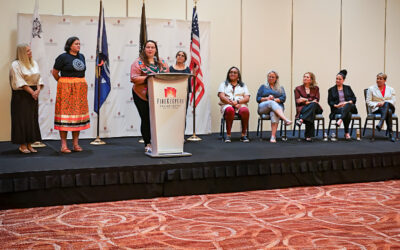On Thursday, May 5, clad in red and black, a crowd of hundreds of Nottawaseppi Huron Band of Potawatomi, Match-E-Be-Nash-She-Wish Band of Pottawatomi Indians and Pokagon Band of Potawatomi marched alongside Indigenous and non-Native allies. They gathered to share personal stories, healing Songs and Dances, statistics and spread the message about Missing and Murdered Indigenous People’s Awareness Day.
This year, President Biden, Michigan Governor Gretchen Whitmer and Grand Rapids Mayor Rosalynn Bliss each declared May 5 as the official Missing and Murdered Indigenous Persons Awareness Day for the U.S., Michigan and the city of Grand Rapids, respectively.
To honor and commemorate the day, the three Potawatomi Tribes collaborated to organize and host the March for MMIP. Representatives from the offices of the mayor and governor read aloud their proclamations. Jingle Dancers inspired others in the crowd to Dance the healing Dance.
Master of Ceremonies and Member of Saginaw Chippewa Indian Tribe Melissa Isaac opened the event, reminding attendees that we are all changed by the global pandemic before passing the mic to NHBP Tribal Council Secretary Nancy Smit.
“Creator, I would like to thank you for this day; thank you for all the hearts that are here and all the hearts that are represented, that are missing, that are lost and just waiting to be found. We acknowledge them today,” Smit said before stepping off the stage to make space for a water ceremony.
Following the Water Ceremony, NHBP’s Honorable Chief Judge Melissa Pope spoke on legislation that has impacted the overall landscape of Missing and Murdered Indigenous People, specifically noting the 2022 Violence Against Women Act.
“Despite the many flaws and complete lack of repair and restoration that VAWA 2022 does, it is a step in the right direction. VAWA 2013 was a sliver of that jurisdiction returned, and we got another sliver,” Pope said.
Beginning in October, the newly enacted VAWA from the Biden administration will allow Tribes with the resources to prosecute sexual assault by non-Natives on Tribal land, Pope explained to the gathered crowd.
“We’re going to prove over, and over, and over again that our Native Nations and our Tribal Courts and our Tribal police and prosecutors, our Tribal social services, health departments, all of it, the entire governments can fulfill their sacred duty to protect and care for their own Tribal citizens,” she said.
Following Pope’s speech, the family of Nangonhs-Bën Massey spoke on the experience of losing their daughter a non-Native woman who took her life prematurely and their process in court fighting for justice.
“Our family fought hard for Nangonhs and although 20 years doesn’t seem like enough for taking a life, we are somewhat okay with it,” said Massey’s mother, Melissa Pamp.
Aside from the justice served in the form of a 20-year sentence in federal prison, Pamp explained that she wants her daughter’s name and life to be more than just another Missing or Murdered Indigenous Woman.
“Nangonhs loved being a mother. Her son, Migwaan, meant the world to her. She had a passion for art. She loved to cook. She was goofy. She was a good friend. She was nonjudgmental and she was very forgiving. She was an MMIW advocate and Water Protector. She had her whole life ahead of her. She still lives through us, through our memories and our love for her. Her story is being told and she’s starting the conversation about Missing and Murdered Indigenous Women,” Pamp said.
“…When something like this happens, it affects us all. We all know someone, at least one person, that MMIW has affected. I would encourage you to use your voice, to be the voice for those who cannot be with us. Seek justice.”
Despite the heaviness of the event’s origins, “it was an amazing day” said NHBP Tribal Council Coordinator and Tribal Member Robyn Burlingham, who was in attendance and on the event’s task force.
“When we came back across the bridge on Pearl Street,” Burlingham recalled after completing the 1-mile-walk portion of the event, “you turned to the right and you could see all our Indigenous relatives and supporters coming across the bridge; you could see a sea of red. It gave me chills. As well as raising awareness of MMIW or MMIP, my hope is that any individual or families there affected by MMIW felt support of those present.”
For a more in-depth look at the Missing and Murdered Indigenous Persons movement in the July Quarterly Turtle Press.




0 Comments